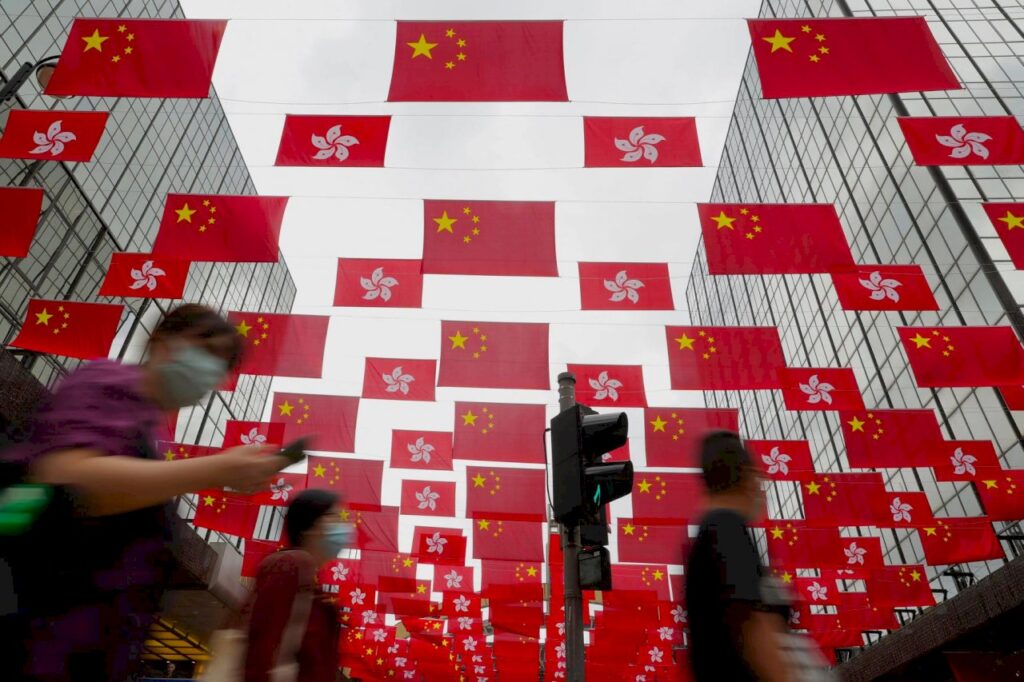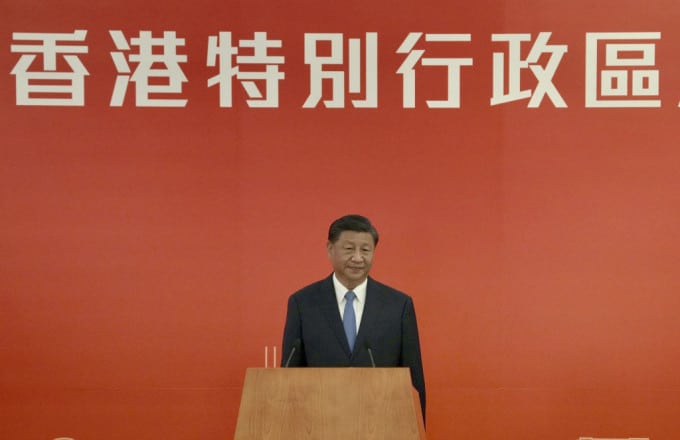The post-occupation era has left behind a deeply divided political situation, with the political spectrum broadening and polarization intensifying.
Repairing social divisions is the common aspiration of most citizens and is also the top priority in Carrie Lam’s election declaration. On the first anniversary of the new government’s administration, can it cool down social conflicts? There is a gentle breeze blowing in the political arena, and public opinion is tired of radicalism. Has the "Third Way" that advocates moderate politics created conditions for rebuilding harmony?
Deradicalization and the politics of moderation
Although there were political controversies such as the "co-location" legislation, the disqualification of candidates for the Legislative Council election, and the sentencing of social movement cases during Carrie Lam's term, there were many innovations in Carrie Lam's governance: the government reopened the "Citizen's Square" The Chief Executive's monthly attendance at the Legislative Council's Q&A session, the advisory structure's invitation to young people to become members, and the official press conference allowing interviews by purely online media all demonstrate a willingness to communicate. Lam extended an olive branch, and non-establishment factions also responded by ending the "non-cooperation movement", passing a motion of thanks for the first policy address, and even inviting the chief executive to attend fund-raising dinners and other activities.
The executive-legislative deadlock has eased, a climate of willingness to dialogue and compromise has been restored, and radical voices have gradually lost support. "Democratic Thoughts" has been conducting polls on the overview of "one country, two systems" every six months since mid-2017. So far, there have been three rounds of surveys, covering Lam Cheng's first year in office. The attached picture shows the proportion of various political leanings in the adult population in the three rounds of surveys. Centrists (including respondents who tend to be "centrist" and those who have no political leanings) have always been the largest group, and the proportion has continued to rise from 58.4% in mid-2017. 61.9% in mid-2018, increasing the number of people to 212,000, promoting the formation of moderate politics. During the same period, the proportion of non-establishment factions continued to decline from 28.3% to 25.2%, with a loss of 188,000 people, reflecting the emergence of de-radicalization in the political situation and the initial trend of supporters of non-establishment factions switching to the centrists.
The distribution of political leanings in Hong Kong requires careful interpretation. Candidates from the non-establishment camp received 54% votes in the 2016 Legislative Council election. However, in the three rounds of polls, the number of citizens who preferred the non-establishment camp has been less than 30%. This gap is believed to be because many Hong Kong adults are not registered as voters, or are registered but do not vote. Since non-establishment parties have always been more vocal, citizens who are not enthusiastic about voting are more likely to belong to the centrists. In the 2016 Legislative Council election, there were about 4.8 million eligible voters in Hong Kong, of which only about 3.8 million were registered voters, of which only 2.2 million voted. Non-establishment candidates received 1.19 million votes in this election, which is less than the 25% of eligible voters in Hong Kong and less than the 20% of the 6 million adult population (excluding foreign domestic helpers). This figure is quite close to the distribution of political leanings obtained from polls.
Public sentiment improved after Carrie Lam took office
However, the three rounds of surveys only covered one year, and the above observations cannot be concluded as definitive based on short-term data alone. The popularity of the chief executive reflects changes in the social atmosphere to some extent. In order to trace and compare developments in previous years, we use the monthly survey on the popularity of the chief executive conducted by the Hong Kong Asia-Pacific Institute of the Chinese University of Hong Kong to observe changes in the popularity of the chief executive.
The survey shows that Leung Chun-ying's popularity has been sluggish in his last year, ranging from about 39 points to 43 points (100 points); in the last month, it fell to a low of 38.8 points, which was maintained at about 53 points after Carrie Lam took office. Compared with the 58-point level, there is a huge gap. Moreover, during the last six months of Leung Chun-ying's term, about 10% citizens gave him an extremely negative rating of 0 points. The relevant number dropped sharply to the latest 3.7% after Carrie Lam took office. The dissatisfaction projected by society on the chief executive seems to have gradually subsided.
In addition to the significant increase in the chief executive's overall popularity, the change in public sentiment is also reflected in the public's evaluation of the chief executive's performance in various aspects. The Asia-Pacific Institute of CUHK conducted another telephone survey in late June this year to explore the public’s evaluation of Lam Cheng’s performance in various aspects. It was found that 8 out of 10 policy performances were rated as qualified (50 points being qualified), with the highest score of 4 The items in order are "ability to do things", "trustworthiness", "integrity" and "tolerance of all political forces". The results show that public opinion generally agrees that political forces of different factions can coexist under Carrie Lam's administration, confirming that the political and social environment is moving in the direction of de-radicalization and moderation.
Non-establishment dissatisfaction grows
Although moderate politics is gradually taking shape and the number of centrists is increasing, three phenomena can be observed from the "Democratic Thinking" polls on "one country, two systems" in the past year, showing that non-establishment parties seem to be increasingly dissatisfied with the status quo. The reason may be that the non-establishment faction that switched to the centrist wing is the more moderate wing, leaving behind a group with stronger opposition. First, the scores of the non-establishment parties in eight areas including judicial independence, high degree of autonomy, and democratic development under "one country, two systems" dropped from 3.46 to 3.1 (out of 10), while those of the public rose from 4.88 to 4.9. The trend is opposite. Secondly, their identification with "Chinese" also declined, from 5.16 points to 4.5 points, which is also opposite to the general trend of rising from 6.63 points to 6.78 points. Furthermore, the proportion of them planning to immigrate overseas is higher than that of the general public: the proportion of non-establishment people planning to immigrate has increased significantly from 19% to 25.2% in one year, while the proportion of general citizens has dropped from 13.5% to 13%.
In the severe political situation where society is divided, it is not easy to mend the sky like Nuwa. Over the past year, public sentiment has softened under Carrie Lam's administration, and the "Third Way" position has gradually gained public understanding. Centrists who have not received enough attention in the past are growing day by day. Although the overall political climate is de-radicalizing, non-establishment dissatisfaction has increased.
Although they are only a minority and their number is decreasing, they are keen to speak out and actively vote in elections, which has a great influence on public opinion. The political divide in Hong Kong is deepening and will be a destabilizing factor for society in the long run. It is a political problem that the government urgently needs to solve.
The author Song Enrong is a democratic thinker
Co-convenor (Research), Deputy Director of the Center for Economic Research, The Chinese University of Hong Kong, Pan Xuezhi is a
Research Assistant, Shanghai-Hong Kong Development Joint Research Institute



